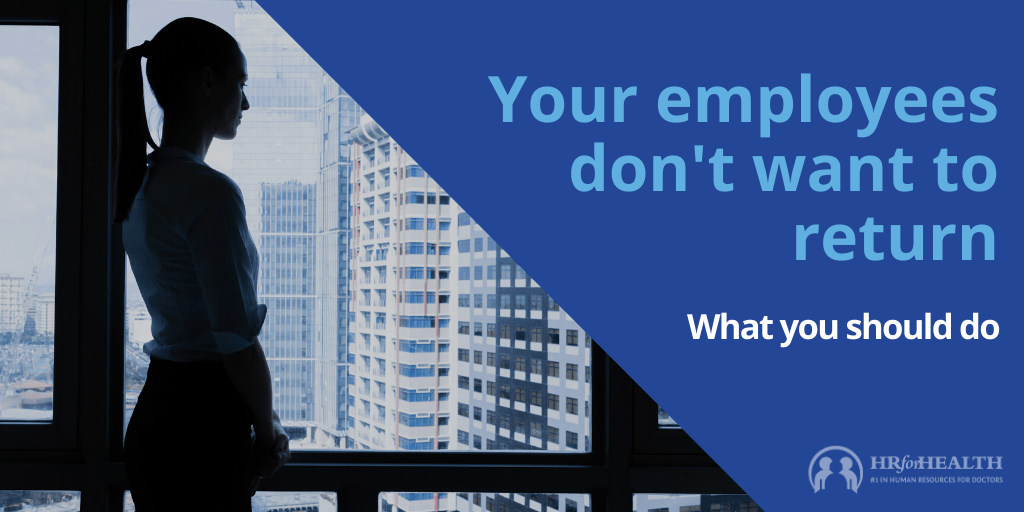(And Answers to Other Important Questions as Team Members Return to Work)
As you plan for re-opening your practice and getting your team back to work, you may be faced with some rather complicated issues. We’ve created a list of the most frequently asked questions regarding these circumstances, as well as our recommendations addressing each one.
Q: What if an employee doesn’t want to return to work because they are making more from unemployment?
A: It’s very important to educate your employees about their unemployment benefits should they decline your job offer. Make sure they understand that if they’ve been offered the job and then decline it, you are obligated to notify the unemployment office about their decision. And when that occurs, that employee is very likely to lose their unemployment benefits entirely.
Once the employee understands that declining your offer means they will be out of a job and unemployment benefits, they may be more likely to return — regardless of the amount they were receiving from unemployment.
Q: What if an employee doesn’t feel it’s safe to come back to work?
A: Considering the incredible uncertainty of these past few months, it’s understandable that some of your team may be apprehensive about returning to work. However, information is power. Take the time to inform your employees about all of the steps you’ve taken to help ensure their safety. Some great topics to cover include:
- Personal Protective Equipment (PPE)
– Your plan for accessing sufficient amounts
– Your investment in appropriate, medical-grade equipment (N95 respirator masks, quality materials, etc.)
– Your commitment to proper instruction for effectively using this equipment - Physical Safety Measures
– Plexiglas shields
– Improved ventilation
– Separate areas for “healthy” and “ill” patients - Policy and Protocol
– Employee and patient health screenings
– Face coverings and social distancing
After listing the multiple measures you’re using to help keep your employees safe, ask them, “Is there anything I’m not doing, but should to make you feel safer?” If they do, in fact, have suggestions for greater or additional provisions, it’s important that you listen carefully and consider their ideas.
Generally speaking, this detailed and logical reporting of your practice’s new safety protocols will be the information your employees need to make a rational and informed decision to return.
Q: Do I have to bring all my team back at the same time?
A: It is perfectly acceptable to stagger the return of your team. In fact, for some, it might even be advisable. This is especially true considering some practices know there is a pent-up demand for their services, while others may experience an actual drop in production.
As you plan your employees’ return, consider the business needs of the practice in deciding who makes the most sense to bring back first (your appointment coordinator, your highest-producing hygienist, etc.) and then bring the remainder of the team (additional front-office help, weekend techs, etc.) as needed. More information in our Roadmap here.
Q: Should I ask high-risk employees back?
A: You may have some employees who are considered at greater risk for contracting the virus. Perhaps they are immunocompromised, pregnant, have an underlying condition, or are simply over 65.
Again, before you do anything, please give HR for Health (or another HR professional) a call so that we can help you navigate this rather tricky situation.
You can certainly extend an offer to these employees, but you cannot legally force their return. If they decide not to come back, that is their right and a decision you must respect.
However, if you decide to not have them return, (or to delay their return) that decision cannot be based on their at-risk status.
As you bring your team back to work, tread lightly. Each employee’s situation, feelings, experience, and maybe even value to your practice is bound to be different. You may not be able to “get the old gang back together.” But, with careful consideration and communication you can improve your chances of getting your most valuable employees to return to your practice.
We’re here to help!
If you are a current HR for Health client and have additional questions, please reach out to our team by calling 877-779-4747. Please keep in mind that due to an influx in questions related to the COVID-19 outbreak, our response time may be slower than usual, but we will get back to you as soon as we can!
If you are not a current HR for Health client and have additional questions, please schedule an HR consultation with us by booking time here or calling us at 877-779-4747, option 1.
We provide services to help you handle compliance with state laws, hiring, and all your other HR needs. If you have questions about managing your employees during the COVID-19 pandemic or any other questions, please reach out to us and SCHEDULE A CALL, or call: 877.779.4747, or email: [email protected].
HR for Health is one of the nation’s leading Human Resources Management Systems (HRMS) used by small to mid-sized practices. HR for Health has provided the following complimentary articles to ensure you have a game plan when addressing complex HR matters.
Quick note: This is not to be taken as legal or HR advice. Since employment laws change over time and can vary by location and industry, consult a lawyer or HR expert for specific guidance. Learn about HR for Health’s HR services


